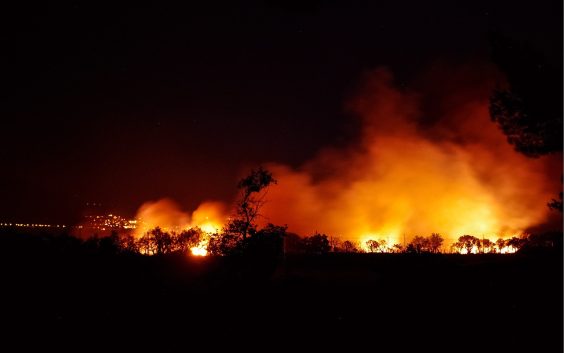Wildfires, dust storms, heatwaves and other extreme events linked to climate change will have profound consequences on the world’s air quality and are major threats to patients with Chronic Obstructive Pulmonary Disease (COPD), says new research.
A new report led by Providence Research scientist Don Sin summarizes the impact of air pollution on COPD and provides a direction to improve the care and outcomes for patients with COPD worldwide.
Exposure to air pollution is a major contributor to the development and exacerbation of COPD. Notably, while cigarette smoking is the leading risk factor for COPD, air pollution is the leading known risk factor for lifetime non-smokers.
Dr. Sin, Director of UBC’s Centre for Heart Lung Innovation at St. Paul’s Hospital, led the review, commissioned by the Global Initiative for Chronic Obstructive Lung Disease (GOLD) Committee. It works with health care professionals and public-health officials from around the world to raise awareness and improve the prevention and treatment of COPD.
Air pollution worsens COPD
Air pollution is a mixture of gasses and particles in the air, both of which contribute to and worsen COPD. It is a leading health hazard around the world and is responsible for millions of deaths per year.
The smallest air pollution particles are known as PM2.5, referring to particles 2.5 microns or smaller – there are about 25,000 microns in an inch. These particles can cause the most harm. The report found that, while exposure to coarse airborne particles was not associated with the risk of COPD exacerbations, both long-term and short term exposure to PM2.5 increased COPD symptoms and accelerated lung function decline.

“The acute effects [on COPD] are largely mediated by the gasses, but the long-term and even more insidious components of air pollution are driven by these particles,” says Dr. Sin. “These particles can get inside the respiratory tract, inside the lungs, and stay there – not just for a few days, but weeks, months, sometimes years and decades – and can cause disruption to the normal immune system of the lung.”
Exposure to air pollution causes acute and long-term symptoms
In addition to playing a significant role in the development of COPD, exposure to air pollution can exacerbate the condition for those who already have it, causing immediate and long-term effects.
“The acute affect is fairly obvious – runny eyes, cough, sputum production, and shortness of breath. Patients living with COPD are more susceptible to these acute affects than individuals without COPD,” says Dr. Sin. These symptoms can potentially cause an acute lung event that can prompt emergency department visits, hospitalization, and, in severe cases, even death.
Air pollution has impacts that go beyond the lungs, he adds.

Wildfires and other extreme weather events contribute to air pollution that worsens the effects on COPD, study finds. Photo: Courtesy Pixabay.
“Another important acute effect that is often unrecognized is that air pollution, especially the particles, has a terrible effect on the vasculature – the blood vessels.”
COPD patients can have fragile or impaired blood vessels, and during instances of high air pollution, they are more likely to experience stroke, heart attacks, angina and other cardiovascular events. Air pollution may also raise a COPD patient’s risk for respiratory infections.
Patients living with COPD are susceptible to even modest increases in air pollution levels. If the poor air quality continues, these symptoms will persist and their COPD will progress. They will become even more susceptible to hospitalization, stroke, heart attacks and even lung cancer.
Air pollution does not just affect those with COPD
The report also discusses how exposure to air pollution can stunt lung growth in children. Dr. Sin likens the lungs to a flower garden – in order to grow, they need nutrients and good air. Children whose lung growth is stunted will have small lungs forever, and because of that, will be more susceptible to developing COPD, lung cancer, and many other complications.
While cigarette smoking is the leading cause of COPD, air pollution affects everyone in an area, not just the individuals who are smoking. It is also more constant and difficult to avoid.
“With cigarettes, you have a very high exposure of toxins for a short period of time, and it’s dispersed throughout the day. Bad air is persistent – we have to breathe. Most people breathe 10 to 20 times every minute – it’s not as if we can stop breathing,” says Dr. Sin.
Recommendations to improve health and air quality
The report provides recommendations to benefit the health of people living with COPD, including strong public health policies to reduce ambient air pollution and implementing air quality warning systems to let patients know when air pollution levels have exceeded an acceptable threshold.
Individuals can take mitigation measures such as avoiding exercising outdoors when the air quality is bad, particularly during wildfire season, and getting an indoor air purifier with a HEPA filter.
“What I would advise British Columbians to do is to check their air quality on a daily basis. If the air quality is considered intermediate or poor, to stay indoors, and to consider getting an air cleaner if they have chronic diseases like COPD, asthma or chronic heart disease,” says Dr. Sin.
Story by Grace Jenkins, Providence Research





